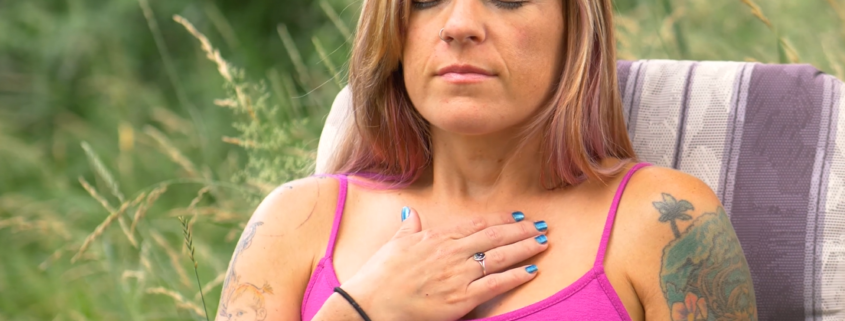Self-Compassion- One of the Most Healing Gifts
How do you talk to yourself about your challenges and setbacks in life (that we all face)- whether large or small, your shortcomings, or missing the mark?
Dr. Kristin Neff advises~
“Instead of mercilessly judging and criticizing yourself for various inadequacies and shortcomings, self-compassion means you are kind and understanding when confronted with personal failings- after all, whoever said you were supposed to be perfect?”
Perhaps you’re thinking- “My parents, community, school, spouse, in-laws, boss and myself?!” If you struggle with “not being enough” or self-criticism, read on.
In an AMAZING interview of Kristin Neff, an expert on self-compassion, she shares her life story that included an event that led to extreme shame and how her experience of learning the practice of self-compassion helped her heal. Her healing led to her research on how to transform shame and self-criticism into self-compassion and the incredible benefits of self-compassion.
Here is the link to the interview, “Being Kind to Yourself” on CPR’s Hidden Brain show.
The benefits of self-compassion, drawn from close to 4,000 studies, are that individuals are: happier, more satisfied with their lives, less depressed, anxious, less likely to engage in addiction or other self-destructive ways of coping with pain, eat and sleep better, are more motivated, and better in relationships. Their partners described them as “more intimate, closer, and more caring”.
One more piece of good news is that Dr. Neff’s research debunks the myth that self-criticism is the surest path to self-improvement, success and productivity. What she instead found was that self-compassion leads people to taking more responsibility for their mistakes, more conscientiousness, and are more likely to apologize.
Just a few months ago, I had a painful personal experience that required self-compassion to heal. My story is below…
Fortunately, on that day, I came across this incredibly comforting and wise podcast episode called “Learning From Our Mistakes” from Dr. Robert Puff. Similar to Dr. Neff, he was courageous enough to share a serious mistake he made and how he spoke to himself in a self-compassionate way. Here is the link.
Dr. Robert Puff explained, “We are going to make mistakes… over and over again. If we want to stop, we need to look honestly at the whole picture– without self-criticism- and learn from it.”
Why not destroy yourself with thoughts or words when you’ve done something dreadful or even horrific? Self-criticism only keeps us stuck because what we think is what we are! On the other hand, when we ask ourselves in a gentle way, “What can I learn from this?”, we can be a positive force for change.
Lastly, I’d like to add that accepting that making mistakes is part of the human experience also can help us strengthen our self-compassion. By putting our challenges in perspective, practicing letting go and self-acceptance and maybe even at times laughing at ourselves, we can heal.

Here’s a recent personal story of how self-compassion helped me~
A few months ago, I made a terrifying mistake that thankfully did not lead to disastrous results. I definitely think a guardian angel was watching over my son, me and others on the road… I drove right through a flashing red light as I was rushing to get my son to one of his activities. Although I am normally an over the top cautious driver, especially when transporting “precious cargo” (any child), on that day, I got disoriented and made a serious error. Gratefully, no one (and no property) got hurt!
Although I felt ashamed, I have the type of relationship with my husband in which we can tell each other ANYTHING because we know that our partner will accept and comfort us, in addition to challenge us to grow, and still love us as an imperfect human being.
What was surprising was that my husband, who has absolutely no driving tickets to his name, made the same mistake a few days later!
What’s most significant about this story is HOW differently my husband and I responded- what we told ourselves– after the situation. I have found that our automatic responses are largely influenced by our childhood or adult traumatic events- unless we consistently practice effective tools to transform them.
I berated myself, “What’s wrong with you?! You’re not safe on the road!” And for about a minute (because blaming others is not my nature, so it doesn’t work because I know it’s not true!), I got angry at the city workers who installed the flashing red light. Then, it took me a couple of hours to calm down through meditation and soothing self-talk.
On the other hand, my husband said to himself, “I can’t believe I just did that… Lana just told me about the flashing red light!” He was frustrated with himself, but even more so, he was AMUSED by his humanity.
Dr. Neff would advise us to say something kinder and in a soothing tone, ex. “It’s okay. Everybody makes mistakes. It’s not the end of the world.”
When I’m consistent with my meditation and personal growth practice and reach out to my circle of support, I too am able to do the things my husband does naturally (from his different upbringing and view of himself)- LAUGH at myself, put my shortcomings in perspective, and either let a trivial setback go or commit to working on change for a more significant area of my life.
Even therapists need to continually learn and grow. I am proud to say that I am currently reading one of Dr. Neff’s books because, as her research shows, it’s so much easier for most of us to be much more compassionate toward others. In the new year, I too am looking forward to practicing more self-compassion.
Wishing you more compassion for yourself & others!
Lana Isaacson, LCSW, CAS




